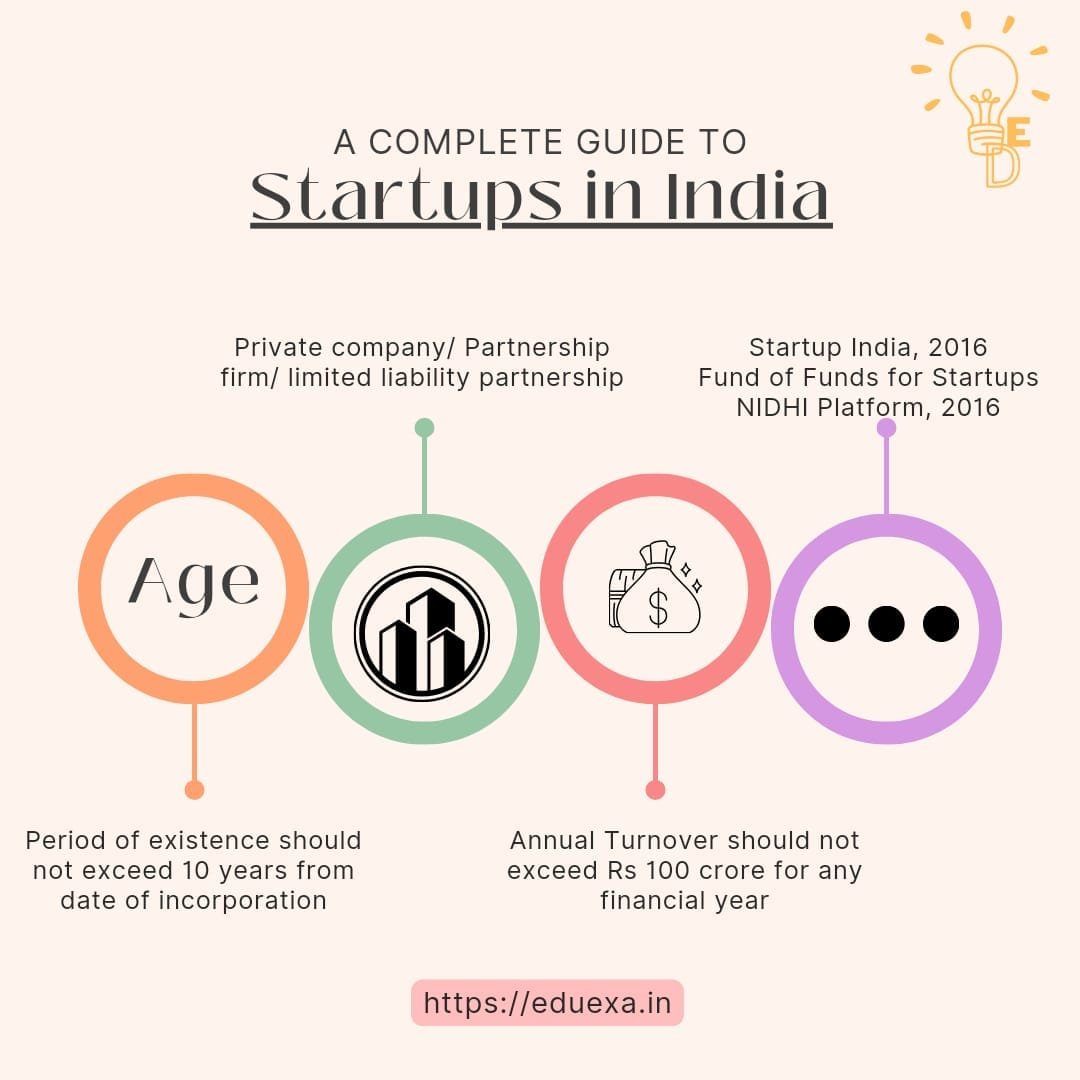Startups in India: A Complete Guide in 2024
Startups in India
Definition- A company or entity is referred to as a startup if it fulfils certain criteria/parameters given by the Department of Promotion of Industry and Internal Trade (DPIIT, Ministry of Commerce and Industry) under Startup India Scheme.
- Company Age – Period of existence and operations should not exceed 10 years from the Date of Incorporation.
- Company Type – Incorporated as a Private Limited Company/ Partnership firm/ Limited liability partnership
- Annual Turnover – Less than 100 crore for every financial year
| Initiatives launched to promote Startup Culture in India | |
| Startup India, 2016 | Startup India is a flagship initiative of the Government of India, administered by the Ministry of Commerce and Industry, intended to catalyse startup culture and build a strong and inclusive ecosystem for innovation and entrepreneurship in India. |
| Startup India Seed Fund Scheme (SISFS), 2021 | Startup India Seed Fund Scheme (SISFS) aims to provide financial assistance to startups for proof of concept, prototype development, product trials, market entry and commercialization. |
| Fund of Funds for Startups Scheme (FFS), 2016 | Under FFS, the Scheme does not directly invest in startups, instead provides capital to SEBI-registered AIFs, known as daughter funds, who in turn invest money in growing Indian startups through equity and equity-linked instruments. |
| Credit Guarantee Scheme for Startups (CGSS), 2022 | The Government of India established the Credit Guarantee Scheme for Startups with a fixed corpus for providing credit guarantees to loans extended to DPIIT recognized startups by Scheduled Commercial Banks, Non-Banking Financial Companies (NBFCs) and Venture Debt Funds (VDFs) under SEBI registered Alternative Investment Funds. |
Read about Dravidian Style of Temple here.
Statistics related to Startup in India
- India has become the 3rd largest start-up ecosystem in the world after the US and China.
- India is home to as many as 98,000 Startups as of 2023 .
- 49% of start-ups are from tier-2 and tier-3 cities.
- 108 unicorns as of May 2023.
Impact of Startups
Promoted employment opportunities: Startups are well known for employing youth at a satisfactory wages as per skills.
Developing Tier 2 and 3 cities : Approximately 47% of the recognised startups are from Tier 2 and 3 cities, which provides employment opportunities and help in improving standard of living there.
Women Empowerment: Approximately 47% of recognised startups in the country have at least one woman director.
Rise in Research and Development: They promote new ideas and innovations. For instance, Deep Tech Startups.
Promoted democratisation of technology and Inclusivity: Fintech startups are now reaching out to remote areas, for instance, Paytm, etc.
Attracted new investments: Startups have attracted multinational corporations to bring in foreign investments.
Issues/Challenges in the Startup Ecosystem of India
Low access to credits and funds- Startups being private companies or limited liability partnerships have lower access to credits and funds generation becomes comparatively difficult.
Less focus on Agriculture: Out of the total recognised startups, only 5.18% are in the agriculture sector.
Low Intellectual Property Rights (IPR): Only 11% of the patent applications filed by startups have been gram patents.
Flipping (Registering in a foreign country): The Economic Survey 2022-23 highlighted the flipping trend due to more access to overseas debt, eliminating the risk of angel tax, better IP protection, etc.
Low utilisation of Income Tax Exemptions: Under Section 80-IAC of the Income Tax Act, 1961, only 1% of recognised startups have received the Certificate of Eligibility.
This Section allows recognised startups a 100% tax exemption for three consecutive profit-making years.
Lack of Infrastructure Support: Absence of adequate and specific testing standards, particularly for startups dealing with hardware products.
Uncertainty with Funding: Funding from angel investors and venture capital firms becomes available to startups after the proof of concept has been provided.
Recommendations of the Committee
Encourage the adoption of advanced technologies: Such as the Internet of Things (IoT), data analytics, etc improve productivity, optimise resource utilisation, and enhance decision-making in agriculture.
Establishing women entrepreneurs-focused funds: To ensure uninterrupted access to capital. Relaxation in regulatory/legal framework: To enable direct overseas listing of unlisted Indian startups and steps facilitate reverse flipping.
Amendments to the Income Tax Act, 1961: So that Employee Stock Option Plans (ESOPs) are taxed only at the time of sale of shares and not on notional gains.
Dynamic testing and certification standards: Shall be established as per international best practices. Filling up the talent gap: Encouraging industries to collaborate with educational institutions to create customised courses.
Encourage partnerships: Between startups and research institutes for collaborative innovation and R&D partnership.



